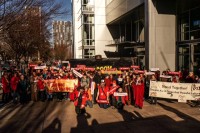Save the Date! April 7, 2015
What: Planning and Sustainability Commission public hearing on Pembina’s proposed code amendment. RSVP today!
When: Tuesday, April 7 2:15-8:00PM. Please arrive by 2:15 for the rally and wear red!
Where: Bureau of Planning and Sustainability 1900 SW 4th Avenue Portland
Testimony: 2 minutes of public testimony is allowed.
Download Talking Points for the Hearing
The largest pipeline company in the Alberta tar sands mining industry, Pembina, wants to export propane (a form of LPG or liquefied petroleum gas) from the Port of Portland’s Terminal 6 on the Columbia River to Asian markets. Pembina’s proposal would create: more profits for fracking and tar sands companies; more mile-long unit trains of explosive propane cutting through our communities; dangerous, pressurized propane storage tanks endangering workers and neighborhoods; and propane supertankers on the Columbia River with the possibility of large ‘security zones’ that restrict other ships and recreational boats. Even more, Pembina’s proposal comes at a time when the City of Portland is attempting to establish itself as a leader in climate policies and sustainability.
Keep Pembina Out of Portland!
- Carbon emissions from fossil fuel exports threaten Portland’s commitment to reducing greenhouse gas emissions!
- The risks of propane leaks or explosions are too great to workers and neighborhoods.
- Pembina’s propane export terminal can actually negatively impact jobs by taking up valuable port space and adding congestion to our rail system.
Pembina’s Dangerous Propane Plan for Portland
Pembina proposes to send mile-long pressurized unit trains of propane to the Port of Portland. From the trains, the propane would be stored in massive storage tanks (up to 33 million gallons) that are refrigerated to negative 44 degrees Fahrenheit. After storage, the LPG would be transferred by pipeline across an area currently protected from this type of industrial activity onto massive ships. Because piping propane through an Environmental Conservation Zone is prohibited, Pembina is currently seeking an amendment to Portland’s Conservation Habitat zoning from Portland’s Planning and Sustainability Commission – a change the Commission can reject.
The first phase of Pembina’s propane export proposal would bring one unit train in or out of the facility daily and load 2-3 outgoing ships of propane per month. However, Pembina has already stated plans to double the size in the future, shipping nearly 80,000 barrels of LPG per day and doubling rail and ship traffic.
The propane will be sourced from "fracked" gas in Western Canada’s Sedimentary Basin. Oil and gas extraction in Canada has drawn international protests because of its profound negative impacts on First Nations peoples and the environment. Additionally, fracking has been linked to serious health and environmental impacts, and recent studies suggest fracked gas can be more climate-destabilizing than coal due to the inevitable leaks of methane that occur during its production and transmission. Pembina and project supporters are attempting to label LPG as a ‘green’ fuel source. However, its origins and extraction processes, the energy cost of its transport, and the ultimate combustion of LPG make it a huge source of carbon pollution and environmental destruction.
Pembina: One of Portland’s Biggest Carbon Sources
A propane export facility requires a massive amount of energy to operate, including maintaining two 15-million-gallon propane storage tanks at negative 44 degrees Fahrenheit. Pembina’s operation at the Port of Portland alone would account for “…about 0.7% of Portland’s actual emissions,” according to a Portland Bureau of Planning and Sustainability report on the proposed facility. Globally, the report concludes, Pembina’s propane export proposal will represent “…about 0.01% of global CO2 emissions.” These stunning figures still don’t account for the carbon emissions resulting from the extraction, refining and transport of propane or Pembina’s stated plans to double export capacity.
It’s clear that Pembina threatens Portland’s ability to meet its own carbon goals and maintain its role as a national leader in carbon reduction policies. In 2009, Portland and Multnomah County adopted an admirable plan to achieve a 40 percent reduction in greenhouse gas emissions (GHG) by 2030, and an 80 percent reduction by 2050. In December 2014, Portland was recognized as a Climate Action Champion by the White House for its regional climate leadership and for taking decisive action to combat climate change. Approval of Pembina’s propane export terminal will put that reputation at risk as well as the many advantages that come with it.
Portland in the Blast Zone
The Pembina proposal has been public since September 2014 and was quietly in the works for months prior. Despite repeated requests from the public, Pembina has not yet produced information regarding issues of fundamental concern to the community, such as the blast radius if a tank storing propane at negative 44 degrees Fahrenheit leaked and caught fire. Nor have they addressed threats to public safety during transport. Pembina is ill-prepared to respond to essential safety information and their lack of transparency should serve as a red flag that they will not be a good neighbor to Portland or communities along the rail line. Similar facilities across the nation identify the size of the blast zone and evacuation radius that, if applied to Portland, would severely harm workers at the planned Pembina facility, workers at neighboring facilities, and communities nearby.
The proposed location, Terminal 6, is prone to soil liquefaction during an earthquake making this site particularly inappropriate for a propane facility. Residents of the houseboat and manufactured home communities within a few miles of the proposed propane export terminal have voiced opposition to the facility, citing safety concerns and tank explosion risk. Additionally, communities living along the presently undisclosed pressurized propane train route could face additional risks from fires or explosions.
Clogging Rail lines, Harming Local Jobs
Across the nation, but especially in agricultural economies like Oregon, existing industries are suffering from an overload of unit trains of fossil fuels clogging already near-capacity railroads. In 2014 national news outlets including Bloomberg News, the New York Times, and the Seattle Times ran in-depth stories describing the harm unit trains of fossil fuels caused to grain, perishable goods, and container traffic. Grain and container traffic account for a significant amount of the work that occurs at the Port of Portland.
"Propane exports squander the port’s potential by squeezing out rail capacity for other cargoes, including Oregon agricultural projects, containers and more. Pembina’s promise of jobs — other than a short initial construction burst — is simply false."
-Mike Stanton, President ILWU Local 8
“The sheer gravity, magnitude and scope of rail-service disruptions now being experienced are unprecedented, and have rippled through all sectors of grain-based agriculture,” said Cargill executive Kevin Thompson on behalf of the National Grain and Feed Association in testimony to the Surface Transportation Board, the U.S. agency that oversees rail freight. In a report filed with the Board, the U.S. Department of Agriculture reported grain piling up next to elevators, record prices for freight, and grain shippers paying oceangoing ships between $30,000 and $50,000 per day to wait for delayed grain.
In addition, the proposed 60-acre Pembina facility will create a total of only 35-40 permanent jobs on valuable waterfront land that should provide many times that number. At a time when Portland has identified lack of riverfront industrial lands for job creation as its single biggest land deficit, it should not be considering one of its largest remaining developable sites for a facility that will generate just over an anemic half job per acre.
Restricting Recreational Access to the Columbia River
Because of the hazards associated with propane, the Coast Guard could require security zones around ships while they are in Port or traveling on the Columbia. These security zones can extend up to 500 yards while the ships are moving, seriously disrupting the Columbia River to recreation activity and other commerce for four to six days per month. If the facility doubles capacity as Pembina anticipates, this could double to 8-12 days per month.
Jasmine Zimmer-Stucky Jasmine@ColumbiaRiverkeeper.org www.columbiariverkeeper.org
Micah Meskel
mmeskel@audubonportland.org
www.audubonportland.org





